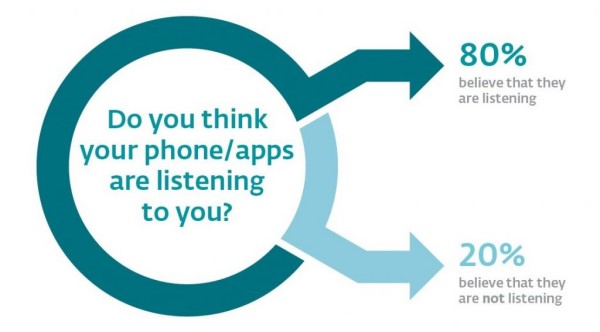Big Tech does NOT need to listen to you
Why should they? There are far better ways to know what you do.
Too many people still believe stuff like this:

<u><em><strong>CAPTION:</strong>
<a href="https://www.welivesecurity.com/2020/02/24/is-your-phone-listening-to-you/" target="_blank">Your phone is LISTENING to you. Yeah, right.</a>
</em></u>
Why “Big Tech LISTENS to me” is wrong
Today I feel compelled to share, with some comments and clarifications by me, the main points from a great Twitter thread by Robert G. Reeve, because this is stuff that should be taught in every school these days.

<u><em><strong>CAPTION:</strong>
<a href="https://starecat.com/dad-says-youre-spying-us-online-hes-not-your-dad-obama-kid/" target="_blank">This is kind of true, but not how you think it is</a>
</em></u>
Sais Reeve that after “a week at my mom’s house and now I’m getting ads for her toothpaste brand, the brand I’ve been putting in my mouth for a week. We never talked about this brand or googled it or anything like that."
Here is why it SEEMS that Facebook, Google etc.. “are listening to you”
- Social media apps don’t need to actually listen because “everything else you give them unthinkingly is way cheaper and way more powerful”
- Your apps collect a ton of data from your phone: location, demographics etc…
- Data aggregators pay to pull in those and other data from EVERYWHERE, including every purchase you make
- Then they aggregate everything together, and that is “where it gets truly nuts”
Before reading how it gets nuts, please do note the “unthinkingly” part. Not “unknowingly”: unthinkingly! As in “this is exactly what you give permission to do”, every time you authorize any app, website or social media platform to do whatever they want with your data. Nothing less, nothing more.
So, aggregators aggregate ALL your data…
Then, they INFER from them. Often wrongly, but not often enough.
For example, if two or more smartphones are close almost every night and weekend, in private homes they almost surely belong to members of the same household (or to relatives, if they are always close, but in “special” moments, e.g. every Sunday at lunch, or at Christmas). If a bunch of phones is close every saturday night in bars or restaurants, their owners are almost surely friends. If they meet in motels… OK, you get the point.
Then, explains Reeve, advertisers can cross-reference your interests and browsing history and purchase history to those around YOU, in order to show YOU different ads based on THOSE people.
In other words, they serve you ads for “things I DON’T WANT, but it knows someone I’m in regular contact with might want.", on the chance that YOU may purchase those things for those other people, or unconsciously push them, while chatting, to purchase them.
No listening here. None at all
None of this, of course, does not need any actual “listening” to happen. It’s just comparison of aggregated metadata. And its results follow you whenever you go online or, as Reeve puts it, “Now I get Twitter ads for mom’s toothpaste”.
It’s not about YOU. It never was
So, concludes Reeve, “your data isn’t just about you. It’s about how it can be used against every person you know, and people you don’t”. Or, as I have said several time myself, “your CONTACTS are the product”. So, follow Reeve’s advice: “Block the F**K out of every app’s ads”.
Who writes this, why, and how to help
I am Marco Fioretti, tech writer and aspiring polymath doing human-digital research and popularization.
I do it because YOUR civil rights and the quality of YOUR life depend every year more on how software is used AROUND you.
To this end, I have already shared more than a million words on this blog, without any paywall or user tracking, and am sharing the next million through a newsletter, also without any paywall.
The more direct support I get, the more I can continue to inform for free parents, teachers, decision makers, and everybody else who should know more stuff like this. You can support me with paid subscriptions to my newsletter, donations via PayPal (mfioretti@nexaima.net) or LiberaPay, or in any of the other ways listed here.THANKS for your support!